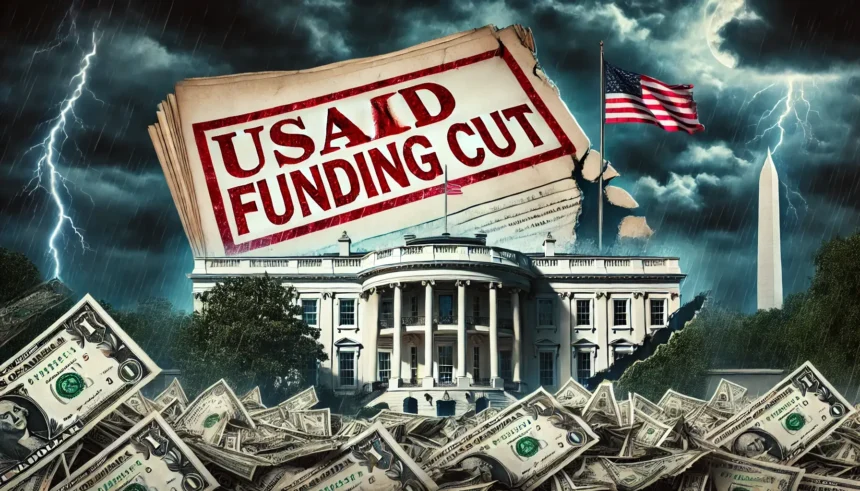90% Cut to USAID Funding
In a dramatic shift in U.S. foreign policy, the Trump administration has announced a staggering 90% reduction in funding for the United States Agency for International Development (USAID). This decision, part of President Trump’s “America First” agenda, slashes approximately $60 billion in global assistance, marking one of the most aggressive cost-cutting measures in U.S. history.
The move has ignited fierce debate, with critics warning of dire consequences for vulnerable nations, while supporters argue it’s a necessary step to curb what they call “wasteful” international spending.
The Backstory: A Freeze on Foreign Aid
President Trump first signaled his intent to overhaul U.S. foreign aid on his very first day in office, signing an executive order to freeze all foreign assistance for 90 days. The goal was to evaluate which programs were essential and which could be eliminated.
However, the freeze quickly became a legal battleground. A federal judge recently ruled that the administration must release the frozen funds, but the White House defied the order for nearly two weeks. The administration then appealed to the Supreme Court, which temporarily halted the lower court’s ruling, leaving the fate of billions in aid hanging in the balance.
What’s Being Cut?
The review process led to the elimination of nearly 5,800 foreign aid contracts worth $54 billion, with additional cuts affecting grants totaling over $15.9 billion. While some critical programs—such as food aid, HIV and malaria treatments, and support for crisis-hit nations like Haiti and Venezuela—were spared, thousands of other initiatives were axed.
The cuts have also had a profound impact on USAID itself, an agency established in 1961 with over 10,000 employees. The freeze has already resulted in the layoff of 1,600 U.S.-based staff, with many others placed on administrative leave.
The Role of Elon Musk and DOGE
Billionaire entrepreneur Elon Musk, a close advisor to Trump, has played a key role in driving these reforms through the newly created Department of Government Efficiency (DOGE). Musk has been vocal in his criticism of USAID, calling it a “criminal organization” that needed to be dismantled.
At a recent cabinet meeting, Musk defended the cuts, warning that unchecked federal spending could lead to national bankruptcy. “If we don’t do this, America will go bankrupt,” he stated, revealing that he had even received death threats over the initiative.
However, the reforms have faced significant internal resistance. A third of DOGE employees resigned after Musk sent a mass email to two million federal workers, demanding they justify their roles or face termination.
Expanding DOGE’s Authority
In a further escalation, President Trump signed an executive order granting DOGE broader powers to scrutinize federal spending on contracts, grants, and loans. The order also imposed a 30-day “credit card freeze” on government employees, suspending nonessential spending across agencies.
The Global Fallout
The sweeping cuts have sent shockwaves through the international community, with many fearing the reduction in aid will exacerbate crises in already vulnerable regions. Critics argue that the move undermines America’s role as a global leader in humanitarian efforts.
As the Supreme Court prepares to rule on the funding freeze, the future of U.S. foreign aid remains uncertain. For now, the Trump administration’s aggressive cost-cutting measures are poised to reshape America’s approach to global assistance, sparking both praise and condemnation at home and abroad.
Why This Matters
This unprecedented overhaul of U.S. foreign aid reflects a broader shift in priorities under the Trump administration, one that emphasizes domestic concerns over international commitments. Whether this strategy will achieve its intended goals—or lead to unintended consequences—remains to be seen.
For now, the world watches and waits as the debate over America’s role in global humanitarian efforts continues to unfold.
Join the Debate: What’s Your Take on the 90% USAID Funding Cut?
Do you think the 90% cut to USAID funding is a necessary step or a risky move? Share your thoughts in the comments below—we’d love to hear from you! For more breaking news and updates on global policies, subscribe to TN HEADLINES24 and never miss a story.
For more insights on other trending news, click here!
Disclaimer: The information provided in this article is for general informational purposes only. Views and opinions expressed herein do not necessarily reflect the official policy or position of TN HEADLINES24. TN HEADLINES24 is not responsible for any errors, omissions, or inaccuracies in the content or for any actions taken based on this information. For official updates, please refer to verified sources.




